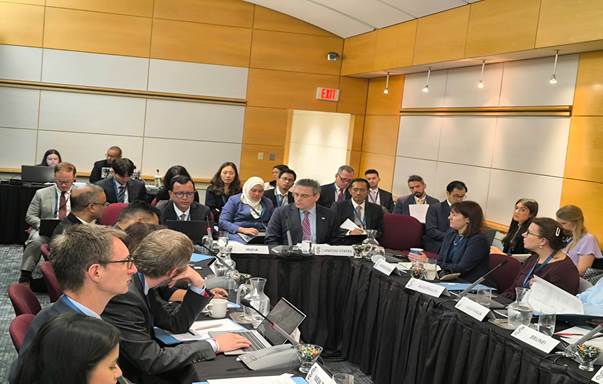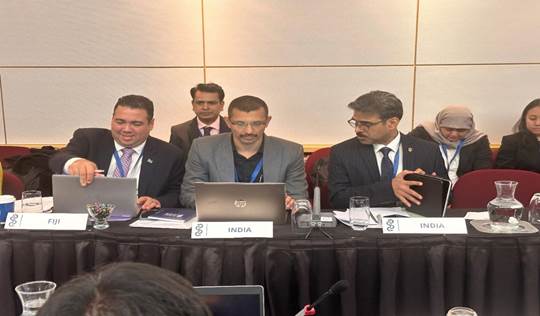Indian delegation attended the first in-Person meeting of the Supply Chain Council of the Indo-Pacific Economic Forum (IPEF) for Prosperity held in Washington DC on 12 September 2024 followed by Crisis Response Network meeting on 13 September 2024. These formal meetings were preceded by Panel discussions on various topics related to supply chain resilience with special focus on the United States initiatives including the creation of dedicated Supply Chain Centre and development of the tool like SCALE.

While the US is the Chair, India is the vice Chair of the Supply Chain Council. Substantial progress was made in this meeting. The Council adopted the one-year work plan detailing the action to be taken by the Council for the entire year. Apart from this, the major achievements were the establishment of three Action Plan Teams pertaining to three sectors, namely Semiconductor; Critical Minerals with a focus on batteries; and Chemicals.
It was also principally agreed by the partner countries to establish another Action Plan Team related to Healthcare/Pharma sector, wherein the Action Plan Team will come into operation once the Chair for the same is finalised. These sectors were identified from the list of critical sectors and key goods notified by the Partner countries. Interested partner countries can join the Action Plan teams within a month of the establishment of the Action Plan Teams. These Action Plan Teams will commence work shortly to prepare its recommendations for the Council on possible collaborative and co-operative efforts among the partner countries for bringing in resilience in supply chain pertaining in those specific critical sectors and key goods.

The formation of Action Plan teams in these areas are highly relevant today in majority of critical supply chains given their supply concentration and the experience learnt from significant disruptions faced during the COVID-19 pandemic. There are challenges and strength in these areas across all IPEF partners. Some examples are given below:
For semiconductor eco-system, one may be endowed with skilled workforce say the design engineers for chip design, others may be in a position to provide high capital investment for fabrication and manufacturing, developed infrastructure etc. The world has witnessed exponential growth in technological advancements and demand for clean energy solutions. This paradigm shift towards a sustainable and low-carbon future has brought to the forefront the critical importance of securing a reliable supply of critical minerals.
The use of specific critical minerals is indispensable for the sectors including clean energy, electronics, defence, transportation, telecommunications, fertilisers, pharmaceuticals. One of the key challenges lies in the supply risk on account of its concentration and global market dynamics and, which can result in price volatility and uncertainty leading to supply disruptions.
Similarly, the growing population puts immense pressure on limited agricultural land for higher yields and in this context, the importance of Agro-chemicals resilient supply chain has become extremely important. According to an estimate, the Agrochemicals Market (fertilizers, pesticides, adjuvants, and plant regulators) is projected to reach USD 282.2 billion by 2028 from USD 235.2 billion by 2023, at a CAGR of 3.7%.
Another major achievement was establishment of two sub-committees for cross cutting issues. While the Sub-committee on Logistics and Movement of Goods would facilitate efforts to improve logistics services and logistics infrastructure in the IPEF region, as well as efforts to enhance trade facilitation practices, the Sub-committee on Data and Analytics would build upon the work already undertaken by IPEF countries to exchange analytical approaches to supply chain exposures and risk. In this context, India also emphasized on the need to work towards workforce development for re-skilling and up-skilling, which is positively under consideration.


After the in-person meeting of the IPEF Supply Chain Council, the Crisis Response Network (CRN) meeting, chaired by the Republic of Korea, was held on 13 September 2024. During the meeting, as part of capacity building, CRN conducted an emergency simulation exercise (table top exercise) involving a supply chain disruption impacting the import and use of certain chemicals by IPEF countries and discussed ways to enhance collaboration across IPEF. CRN is focused on addressing immediate supply chain disruptions.
IPEF Partner countries including India are committed to actively engage in the Action Plan teams and Subcommittees of their interest as they work together in a collaborative and co-operative manner to develop actionable policies and recommendations aimed at strengthening supply chain resilience across the IPEF region.

Supply Chain Resilience Agreement (Pillar II Agreement) under IPEF (a 14-country plurilateral grouping in the Indo-Pacific region.) came into effect from 24 February 2024. The Agreement seeks to strengthen supply chains through economic engagement among partner countries with the goal of advancing growth, peace and prosperity in the region. Under this Agreement, three institutional bodies have been created namely, Supply Chain Council (SCC), Crisis Response Network (CRN) and the Labour Rights Advisory Board (LRAB) with specific functions to achieve the objectives of the Agreement.
On the sidelines of the these IPEF meetings, bilateral meetings were also held with the United States, Australia, New Zealand, Japan, Malaysia, Indonesia and the Republic of Korea to understand their views and the way forward for facilitating robust supply chain in the region.
The next meeting of the Supply Chain Council will be in held December, 2024.

Comments are closed.